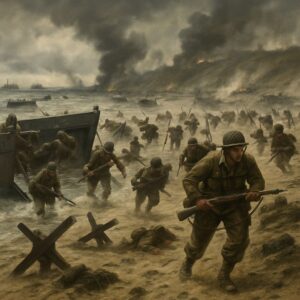On June 6, 1944, the shores of Normandy, France, became the stage for one of the most consequential military operations in modern history: the Allied invasion of Western Europe during World War II, known as D-Day. This operation, codenamed Operation Overlord, marked the beginning of the end for Nazi Germany. After years of planning, coordination, and sacrifice, the Allies—comprised of American, British, Canadian, and other forces—launched the largest amphibious assault ever attempted. The stakes were monumental. A successful landing would open a Western front and relieve pressure on Soviet forces in the East, while a failure could extend the war indefinitely and devastate Allied morale.
In the early hours of the morning, over 156,000 troops crossed the English Channel under the cover of darkness, supported by thousands of ships and aircraft. Their objective was to storm five heavily fortified beaches: Utah, Omaha, Gold, Juno, and Sword. At Omaha Beach in particular, American soldiers faced brutal resistance from entrenched German defenses. Machine-gun fire raked the surf, mines exploded under landing craft, and chaos reigned. Yet, amid the smoke and terror, these young men—some just 18 years old—pressed forward, driven by duty, camaraderie, and an unyielding desire to stop tyranny.
The cost was staggering. By the end of that day, more than 4,000 Allied troops had died, with thousands more wounded or missing. But their sacrifice was not in vain. The landings secured a vital beachhead in Nazi-occupied France, which allowed the Allies to begin their push inland. Within weeks, ports were opened, reinforcements surged in, and the liberation of Paris loomed on the horizon. D-Day became the turning point of the war in Europe—a signal to the world that freedom would not be denied and that the Axis stronghold in Western Europe was beginning to crumble.
Beyond the military statistics and strategic achievements, D-Day holds a powerful emotional resonance. It is a story of courage in the face of near-certain death, of soldiers who left their homes and families to fight for people they’d never met. It reminds us that peace is often bought with tremendous sacrifice, and that the freedoms we enjoy today were earned on the bloodied sands of Normandy. As the number of surviving veterans dwindles with time, our duty remains: to remember them, to honor their bravery, and to ensure that the lessons of that pivotal day never fade into silence.

